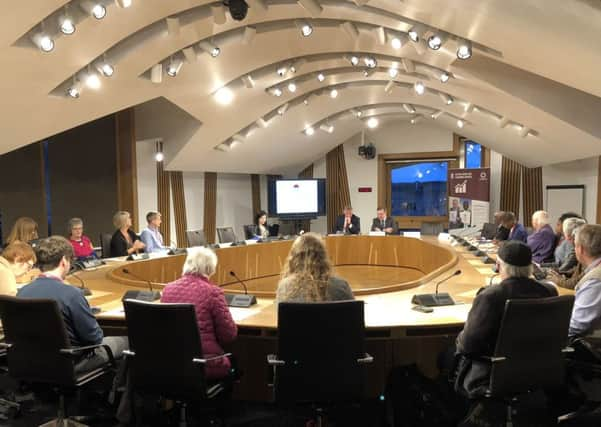Video links Holyrood and Westminster for the first time


It was the first time committees from each parliament were able to share evidence and opinion in real time, with the successful pilot meaning it could potentially be used for other parliamentary business in the future.
Fittingly, the video link allowed members to discuss the future of a nation whose ties with Scotland date back a century.
Advertisement
Hide AdAdvertisement
Hide AdHolyrood was among the first legislatures in the world to routinely broadcast its sessions live on the internet.
But the parliament took its digital development a step further when members of the cross-party group on Malawi and its equivalent all-party group at Westminster were joined via video link on Wednesday by experts on the African nation.
They heard how sustainable developments in the country were still paying dividends thanks to a unique Scottish link.
At the Holyrood session, the headline speaker was Bernard Kaunda, chief executive of Mzuzu Coffee, which received a £3.2m injection from the Commonwealth Development Corporation (CDC) in 1978.
Coffee in Malawi came from a single plant from the Royal Botanic Gardens Edinburgh in the 1890s which was taken to the country by botanist John Buchanan.
The meeting formed part of the Scotland Malawi Partnership’s BuyMalawian 2018 campaign which is exploring how consumers in the UK can help build sustainable economic development in Malawi.
Malawi has a population of around 17 million people, 80 per cent of whom are farmers. Roughly half the population lives on less than £1 a day and it remains one of the poorest countries in the world.
By building markets for exports the campaign aims to help support sustainable livelihoods helping Malawi work itself out of poverty and reduce its dependence on harmful tobacco production.
Advertisement
Hide AdAdvertisement
Hide AdDavid Hope-Jones, chief executive of the Scotland Malawi Partnership, a non-governmental membership organisation founded in 2004, said: “It’s wonderful to see our two parliaments coming together in this way to support UK-Malawi trade and investment. We can see first-hand the positive impact CDC’s investment is continuing to have 40 years on. In the coming years more UK aid will be spent through CDC. We encourage CDC to increase its investments into Malawi to ensure this small country – Scotland’s closest and oldest friend in Africa - can continue to benefit from these Commonwealth links.”
Alexander Stewart MSP, chairman of the Holyrood committe, said: “I am continually inspired by the work done between Malawi and Scotland. Mzuzu Coffee is a fantastic examples of this partnership.
“These along with many others are all key elements in supporting Malawi’s economic development through exports to Scotland and indeed the United Kingdom as a whole.
“Malawian products in the UK as well as Malawian tourism deserve so much focus. Indeed it is intended by the Scotland-Malawi Partnership for this to become an annual campaign, aimed at increasing awareness of all the Malawian products available - and of course Malawi itself as a World Class Tourist destination.”
